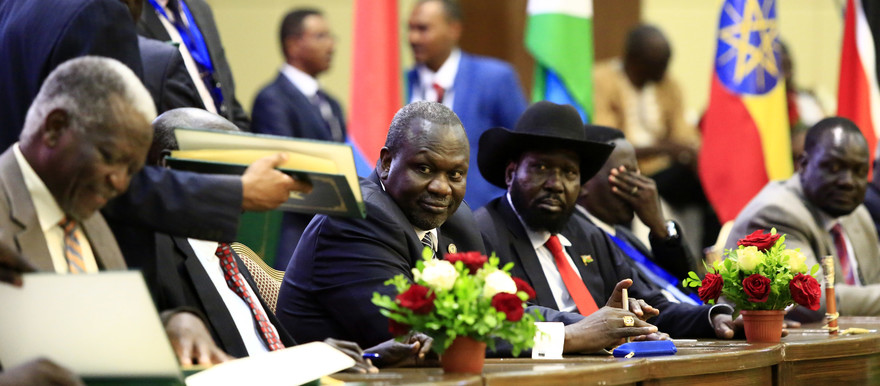Will the latest power-sharing agreement between South Sudanese President Salva Kiir and opposition leader Riek Machar hold, asks Haitham Nouri.
A new power-sharing agreement between the South Sudanese government and the country’s armed opposition was signed this week in the hope of ending the years of violence that have torn South Sudan, one of the youngest countries in the world, apart and rendered thousands dead and millions displaced.
The deal, signed in the Sudanese capital Khartoum, sees South Sudanese opposition leader Riek Machar return to government as one of five vice-presidents to President Salva Kiir.
Sudan and other neighbouring countries mediated the deal, and the leaders of Kenya, Uganda and Djibouti, in addition to western diplomats, attended the signing.
Under the new agreement, the South Sudanese parliament will consist of 550 members, 332 from Kiir’s camp and 128 from Machar’s. Kiir will appoint 20 ministers in the new 35-member government, while nine positions will go to Machar. The rest will go to other smaller groups in South Sudan.
Kiir warned that the number of ministers and MPs may pose a challenge. “Look at the size of the new government and parliament. How will their expenses be paid,” he asked, worried about official offices and vehicles.
The government’s mandate has been set at three years, after which presidential and legislative elections are scheduled to be held.
Sudanese President Omar Al-Bashir said that the neighbouring countries were committed to ensuring that the terms of the agreement were applied. His goal was to see oil-rich South Sudan resume oil production by 1 September, he said.
During the country’s five-year civil war, South Sudan’s oil production dropped to 120,000 barrels per day, down from 350,000, according to World Bank figures.
South Sudan seceded from the rest of Sudan in July 2011 after the longest war Africa has yet endured. It lasted from 1983 to 2005 and was followed by six years of interim rule after which the South Sudanese people voted for secession in a referendum.
Two years later civil war broke out when Kiir toppled Machar after accusing him of conspiring to overthrow him. The infighting claimed the lives of more than 10,000 people and rendered four million displaced.
Until 2015, war raged between Machar’s White Army of armed Nuer tribesmen and the South Sudanese army from the majority Dinka tribe, from which Kiir hails.
At least 232 people had been killed and 120 women and girls were raped in attacks conducted by the South Sudanese and allied forces on villages regarded as opposition strongholds, the UN said in July.
UN High Commissioner for Human Rights Prince Zeid bin Raad Al-Hussein has called for the establishment of a court to put on trial those accused of carrying out war crimes in South Sudan including three military leaders.
The two warring parties have previously signed peace deals mediated by neighbouring countries, but none has held for longer than a few weeks. Adding fuel to the fire have been Machar’s attempts to claim the presidency at a time when Kiir was strongly backed by his Dinka supporters.
With the support of his tribe and neighbouring countries, foremost among them Uganda, Kiir managed to stand his ground.
Scepticism has overshadowed the celebrations of the new deal in the South Sudanese capital Juba despite the optimism of the two signing parties regarding the success of the latest deal.
“They were not forced to sign it,” Kiir said. There are fears that the new power-sharing deal may meet the same fate as the 2015 peace agreement that collapsed and ended with Machar’s fleeing the country.
South Sudan is currently suffering from famine, and the infighting and heavy rains have obstructed the arrival of humanitarian aid in 70 per cent of areas in need, according to the UN World Food Programme (WFP).
The WFP anticipated at the beginning of the year that 7.1 million South Sudanese would suffer from famine from May to July this year.
On the day the deal was signed, many South Sudanese gathered in Khartoum to urge the warring leaders to observe the peace and prevent the deterioration in the living conditions of millions of people in the country whose hopes for a better future were dashed soon after independence.
This article was originally published in Al-Ahram Weekly.
The views expressed in ‘opinion’ articles published by Radio Tamazuj are solely those of the writer. The veracity of any claims made are the responsibility of the author, not Radio Tamazuj.




